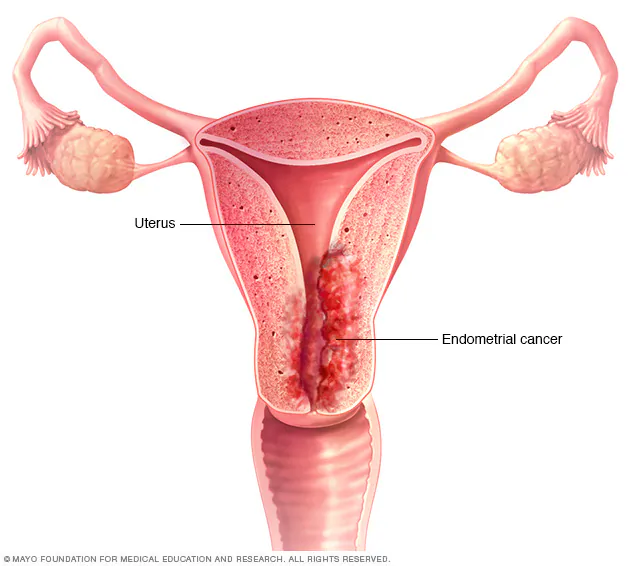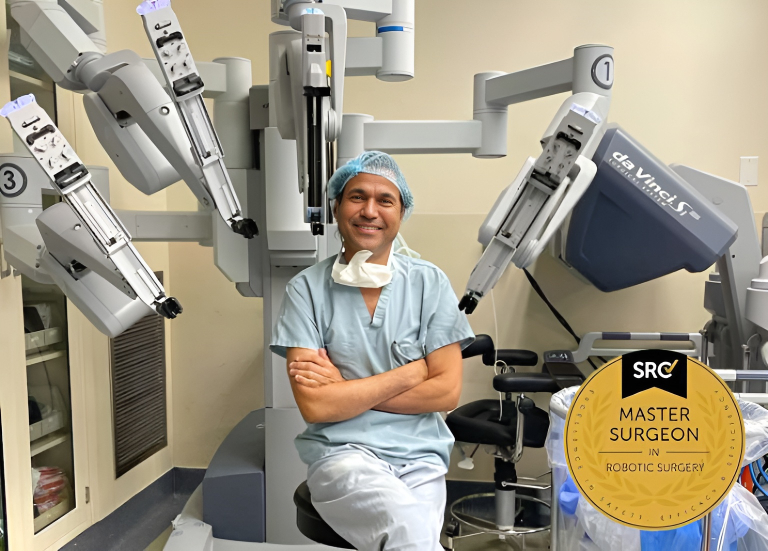Endometrial Cancer Specialist
in Long Island New York
Understanding Endometrial Cancer
Endometrial cancer starts when cells in the uterus begin to grow uncontrollably. The uterus is the pear-shaped organ where a baby grows during pregnancy. This type of cancer usually begins in the layer of cells lining the uterus, known as the endometrium. It’s also called uterine cancer, although there are other, less common types of uterine cancers like uterine sarcoma.
Endometrial cancer is often detected early because it shows symptoms, with irregular vaginal bleeding being a common sign. If found early, removing the uterus through surgery can often cure endometrial cancer.
Stages of Endometrial Cancer
Endometrial cancer is categorized into stages based on the extent of its spread, commonly using the FIGO staging system. In the early stages (I and II), the cancer is confined to the uterus. Stage I specifies whether the cancer is limited to the endometrium (IA) or has spread into less than half of the myometrium, the muscle layer of the uterus (IB). In Stage II, the cancer extends into the cervix, with subcategories indicating involvement of the endometrium and cervix (IIA) or the connective tissue of the cervix (IIB).
Advanced stages (III and IV) suggest that the cancer has spread beyond the uterus. In Stage III, cancer may involve the serosa (outer layer of the uterus) and/or adnexa (fallopian tubes or ovaries – IIIA), invade the vagina (IIIB), or affect lymph nodes in the pelvis (IIIC). Stage IV signifies the most advanced spread, with subcategories indicating invasion into the bladder or rectum (IVA) or distant organs or lymph nodes outside the pelvic area (IVB).

Image Source: Mayo Clinic
Causes of Endometrial Cancer
Endometrial cancer’s development is often linked to specific risk factors that contribute to the abnormal growth of cells in the lining of the uterus, known as the endometrium. One significant factor is hormonal imbalance, particularly an excess of estrogen without the counterbalancing effects of progesterone. This hormonal disproportion can stimulate the uncontrolled proliferation of endometrial cells.
Additionally, age plays a role, with postmenopausal women at a higher risk due to prolonged exposure to estrogen. Obesity is another notable risk factor, as fat tissues can produce estrogen, further disrupting the hormonal balance. Hormone replacement therapy (HRT), especially estrogen-only therapy, can elevate the risk, and pre-existing conditions such as diabetes may also contribute. While these factors are associated with increased susceptibility, it’s important to note that the exact cause of individual cases can vary, and not all individuals with these risk factors will develop endometrial cancer.
Detecting and addressing these risk factors, along with regular gynecological check-ups, can aid in early identification and management of potential concerns, contributing to a more comprehensive approach to endometrial cancer prevention and care.
Symptoms of Endometrial Cancer
The symptoms of endometrial cancer can vary, but the following are five common signs that individuals may experience:
- Abnormal Vaginal Bleeding: The most prevalent symptom is abnormal bleeding, especially in postmenopausal women. This can include irregular periods, bleeding between periods, or unusually heavy menstrual bleeding.
- Pelvic Pain: Some individuals with endometrial cancer may experience pelvic pain or discomfort. This pain can range from a dull ache to sharp, intense pain.
- Pain During Intercourse: Endometrial cancer may cause pain or discomfort during sexual intercourse, which can be attributed to the tumor’s impact on the reproductive organs.
- Pelvic Discomfort or Pressure: A feeling of fullness, pressure, or discomfort in the lower abdomen or pelvis is another potential symptom of endometrial cancer.
- Unexplained Weight Loss: In some cases, individuals with endometrial cancer may experience unexplained weight loss, which can be a sign that the cancer is affecting the body’s metabolism.
It’s important to note that these symptoms can be caused by various conditions, and their presence does not necessarily indicate endometrial cancer. However, if any of these symptoms persist or worsen, it is crucial to schedule an appointment with New York Gynecology Surgery for a thorough evaluation and appropriate diagnostic tests.
What Happens If my Endometrial Cancer is Left Untreated?
If endometrial cancer is left untreated, several significant consequences may arise, including:
- Disease Progression: Without intervention, endometrial cancer can continue to grow and spread within the uterus and potentially extend to nearby structures and organs. As the cancer advances in stage, it becomes more challenging to treat and control.
- Metastasis: Untreated endometrial cancer may lead to the spread of cancer cells to other parts of the body, a process known as metastasis. Secondary tumors can develop in distant organs, impacting their normal functions and complicating treatment options.
- Worsening Symptoms and Complications: The symptoms associated with endometrial cancer, such as abnormal vaginal bleeding, pelvic pain, and discomfort, may worsen over time. Additionally, untreated cancer can lead to complications, including invasion into surrounding structures, affecting bladder or rectal function.
Surgical Treatment of Endometrial Cancer
Surgical treatment is a common and often primary approach for managing endometrial cancer. The main surgical procedure for endometrial cancer is a total hysterectomy, which involves the removal of the uterus, including the cervix. The extent of the surgery may also include the removal of the fallopian tubes and ovaries, a procedure known as salpingo-oophorectomy. This comprehensive surgery is performed to eliminate the primary source of the cancer and reduce the risk of recurrence.
In addition to the primary surgery, there are variations and additional procedures that may be performed based on the stage and characteristics of the cancer:
- Lymph Node Dissection: In some cases, the surgeon may perform lymph node dissection to assess whether the cancer has spread to the lymph nodes. This information helps determine the stage of the cancer and guides further treatment decisions.
- Pelvic and Para-aortic Lymph Node Sampling: Lymph nodes in the pelvic and para-aortic regions may be sampled to evaluate the extent of lymph node involvement and guide postoperative treatment plans.
- Robotic or Laparoscopic Surgery: Minimally invasive techniques, such as robotic-assisted or laparoscopic surgery, may be employed to perform a hysterectomy. These approaches involve smaller incisions, leading to reduced recovery times and shorter hospital stays compared to traditional open surgery.
The choice of surgical procedure depends on various factors, including the stage of the cancer, the overall health of the patient, and the surgeon’s expertise. After surgery, individuals may undergo additional treatments such as radiation therapy, chemotherapy, hormone therapy, or a combination of these, depending on the characteristics of the cancer and the risk of recurrence.
Pankaj Singhal, MD, MS, MHCM, FACOG
Endometrial Cancer Specialist and Robotic Surgeon

A Leader in the Field of Endometriosis and Minimally Invasive Gynecologic Surgery
An experienced healthcare professional with expertise in women’s health, gynecologic cancer, healthcare management, and an MBA in finance.
- Industry expertise with over 12 years of experience in both academic & private health care settings, physician practice management and executive leadership.
- Consistent track record as executive leader and proven ability to excel in complex and dynamic multi-faceted healthcare settings.
- Effective at identifying opportunities for significant value creation (economical, educational, market share and societal). Launched new ACGME fellowship programs, expanded residency programs, launched new system level service lines, expanded clinical market share by 200%, developed physician score cards.
- Proven track record as quality improvement champion, challenges status quo and removes inefficiencies in the system. Developed system wide score cards-OB/GYN, MFM, Gyn Onc, standardized orders sets, consents forms, transfer policies. Improved physician compliance with quality measures.
- Performed over 10,000 robotic gynecologic, endometriosis, and cancer surgeries.
- Known for taking on the most challenging surgery cases that other doctors/centers turn away.
Hear From Our Clients

Joetta Simonette
On May 3, 2018 at Good Samarital Hospital, due to cancer, you performed ovarian surgery on me.
It is now 5 years since that date – 5 years of wellness that has been accomplished through the grace of God guiding your hands and the support of your team and my loving family.
You are an excellent, compassionate and caring doctor who was confident of a good outcome, and so it is!
Thank you, thank you for these past wonderful years. May God continue to bless you. You are in my prayers!

RG Petkos
Power couple Dr. Singhal & Dr. Mclean are amazing!! My experience with them has been absolutely wonderful. I highly recommend either of them for so many reasons mainly for helping me get back some quality of life with my successful full hysterectomy being better than I expected.
The process from the beginning with them was a pleasure and I had quite a challenge beforehand so I’m very grateful that quality, professional, caring doctors still exist!!
I especially appreciate their proactive approach and feel the combination of the care and expertise they provide make for successful outcomes!!

Kimberly Quinde
Dr. Singhal was the doctor who took care of my mother Ivonne Guevara. My mother had gone to 2 other doctors who refused to take care of her fibroid. She was in pain for years and her fibroid had grown really big without her knowing. When my mom went to Dr Singhal she was met with calmness and reassurance that everything will be ok and he would help her get better. Dr. Singhal was so kind and caring all throughout the process.
He took all her worries away and my mom highly recommends him. She hopes every doctor can be as great as Dr. Singhal.
Everyone in his office was so nice to my mom and it was a great experience given the circumstances.
Hospital Affiliations



Request an Appointment
"*" indicates required fields
